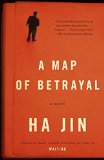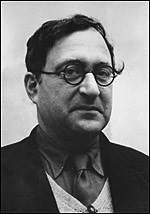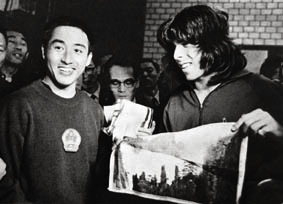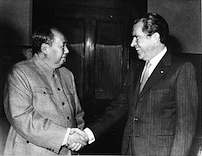Summary | Excerpt | Reading Guide | Reviews | Beyond the Book | Read-Alikes | Genres & Themes | Author Bio

Critics' Opinion:
Readers' Opinion:
First Published:
Nov 2014, 304 pages
Paperback:
Jul 2015, 304 pages
 Book Reviewed by:
Book Reviewed by:
Poornima Apte
Buy This Book
This article relates to A Map of Betrayal
In A Map of Betrayal, Gary Shang is always looking for ways to bring the two countries he loves, China and the United States, together. He claims to be one of the prime drivers for a coup that has come to be called Ping Pong diplomacy, a series of table tennis (ping pong) games between the two countries that signaled a thaw in relations.
 Interestingly enough, the game of ping pong and political machinations share roots going back to the early twentieth century, when an English-born Soviet communist spy, Ivor Montagu, took a fascination for the game and was instrumental in creating the International Table Tennis Federation. Convinced that the sport was just what communist countries around the world needed to improve their cold image, he invited leaders to take part in tournaments and even extended the offer to China. The game of table tennis had already reached the country from Japan, and communist leaders Mao Zedong and Zhu Enlai were known to often indulge in the sport. Montagu thought the sport was a great fit for a country where much work was done in airless factories - workers could take a break with a game of ping pong, or table tennis as it came to be called. China started taking part in the federation's international tournaments in 1951, and in 1959 a Chinese man won the world championship. Soon the game became a national obsession and Mao even declared it to the country's "spiritual weapon."
Interestingly enough, the game of ping pong and political machinations share roots going back to the early twentieth century, when an English-born Soviet communist spy, Ivor Montagu, took a fascination for the game and was instrumental in creating the International Table Tennis Federation. Convinced that the sport was just what communist countries around the world needed to improve their cold image, he invited leaders to take part in tournaments and even extended the offer to China. The game of table tennis had already reached the country from Japan, and communist leaders Mao Zedong and Zhu Enlai were known to often indulge in the sport. Montagu thought the sport was a great fit for a country where much work was done in airless factories - workers could take a break with a game of ping pong, or table tennis as it came to be called. China started taking part in the federation's international tournaments in 1951, and in 1959 a Chinese man won the world championship. Soon the game became a national obsession and Mao even declared it to the country's "spiritual weapon."
 Years later, ping pong would be played as a political maneuver when, at the international championships in 1971 in Nagoya, Japan, an American player, Glenn Cowan, boarded a bus full of Chinese players. The Chinese have said that Cowan hopped on by accident, but he maintained that he was invited on board. Soon enough, the Chinese invited the Americans to the country for a round of table tennis. The Chinese premier, Zhou Enlai, even granted visas to foreign journalists so the event could garner great publicity. It was a feather in the cap for the Chinese premier, but it also came at a time when the United States was looking for its own kind of olive branch to extend to China. With its position in Vietnam floundering, and its relationship with Russia being chilly at best, the United States needed a break. It needed an entity that could help in negotiations with Vietnam. These games provided a perfect opportunity to extend a thaw for which groundwork had already begun. The Americans' visit was followed by one from Secretary of State Henry Kissinger (then President Nixon's national security adviser) and shortly thereafter, President Nixon. The significance of the event for the two countries, which had been enemies for 20 years, was substantial.
Years later, ping pong would be played as a political maneuver when, at the international championships in 1971 in Nagoya, Japan, an American player, Glenn Cowan, boarded a bus full of Chinese players. The Chinese have said that Cowan hopped on by accident, but he maintained that he was invited on board. Soon enough, the Chinese invited the Americans to the country for a round of table tennis. The Chinese premier, Zhou Enlai, even granted visas to foreign journalists so the event could garner great publicity. It was a feather in the cap for the Chinese premier, but it also came at a time when the United States was looking for its own kind of olive branch to extend to China. With its position in Vietnam floundering, and its relationship with Russia being chilly at best, the United States needed a break. It needed an entity that could help in negotiations with Vietnam. These games provided a perfect opportunity to extend a thaw for which groundwork had already begun. The Americans' visit was followed by one from Secretary of State Henry Kissinger (then President Nixon's national security adviser) and shortly thereafter, President Nixon. The significance of the event for the two countries, which had been enemies for 20 years, was substantial.
(In 2002, President George W. Bush, in a trip to China, recalled the significance of the event, telling President Jiang Zemin: "Thirty years ago this week, President Richard Nixon showed the world that two vastly different governments could meet on the grounds of common interest and in a spirit of mutual respect.")
 In 1972, the Chinese table tennis team followed up with a visit of their own to the United States, visiting Colonial Williamsburg and eating apple pie. Author Nicholas Griffin, in his book Ping-Pong Diplomacy, states that when the Chinese had to sing songs, they were confounded by "Row, row, row your boat." They did not want to sing "life is but a dream," a statement that would go against Chairman Mao's teachings. That line was converted to "life is full of steam."
In 1972, the Chinese table tennis team followed up with a visit of their own to the United States, visiting Colonial Williamsburg and eating apple pie. Author Nicholas Griffin, in his book Ping-Pong Diplomacy, states that when the Chinese had to sing songs, they were confounded by "Row, row, row your boat." They did not want to sing "life is but a dream," a statement that would go against Chairman Mao's teachings. That line was converted to "life is full of steam."
Ivor Montagu, courtesy of Chiswick Chap
Zhuang Zedung and Glenn Cowan, courtesy of www.chinatoday.com.cn
President Nixon and Mao Zedong in 1972, courtesy of Schaengel89
Filed under Society and Politics
![]() This "beyond the book article" relates to A Map of Betrayal. It originally ran in November 2014 and has been updated for the
July 2015 paperback edition.
Go to magazine.
This "beyond the book article" relates to A Map of Betrayal. It originally ran in November 2014 and has been updated for the
July 2015 paperback edition.
Go to magazine.





The Funeral Cryer by Wenyan Lu
Debut novelist Wenyan Lu brings us this witty yet profound story about one woman's midlife reawakening in contemporary rural China.
Your guide toexceptional books
BookBrowse seeks out and recommends the best in contemporary fiction and nonfiction—books that not only engage and entertain but also deepen our understanding of ourselves and the world around us.